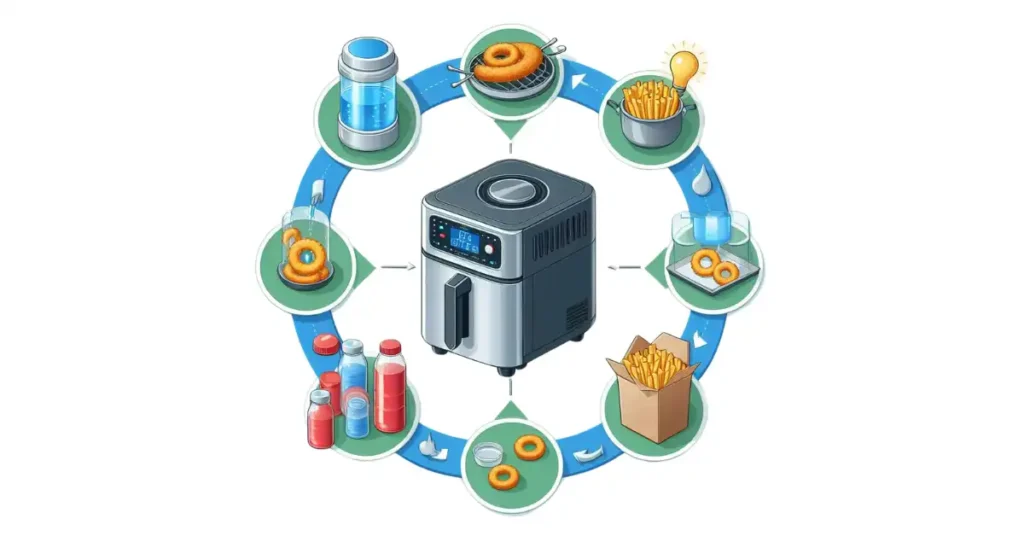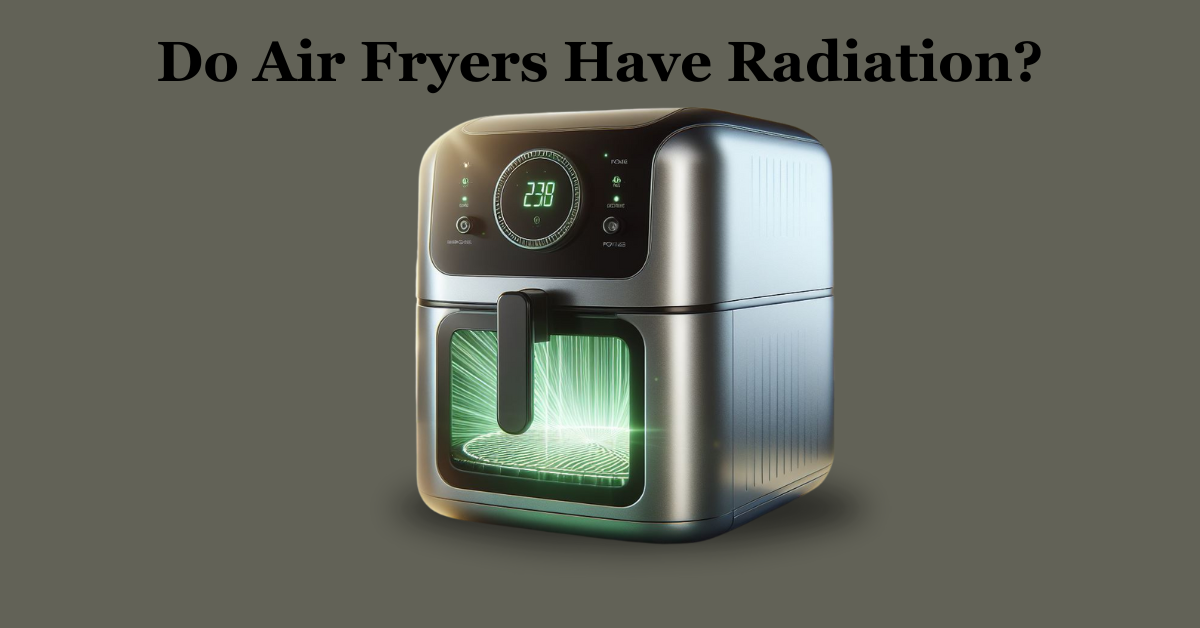Are you worried about the safety of air fryers and pondering, “do air fryers have radiation?” Many people share this concern, especially with the increasing emphasis on healthy living and the fear of exposure to harmful radiation from kitchen appliances.
The good news is that this article is here to dissolve your worries by providing insightful information about air fryers. We’ll explore the truth behind the radiation rumors, how air fryers work, and why they are a safe option for cooking your favorite meals. Keep reading to learn more about the safety of using air fryers and how they can be a healthy addition to your kitchen appliances.
Table Of Content
Let’s Know That Do Air Fryers have Radiation?
Air fryers have become a popular kitchen gadget for those who love the taste of fried food but want to avoid the extra calories from oil. But, have you ever wondered if they’re safe? Specifically, do air fryers emit harmful radiation like some other appliances? This section will clear up any confusion and explain why air fryers are considered a safe choice for cooking delicious and healthy meals at home.
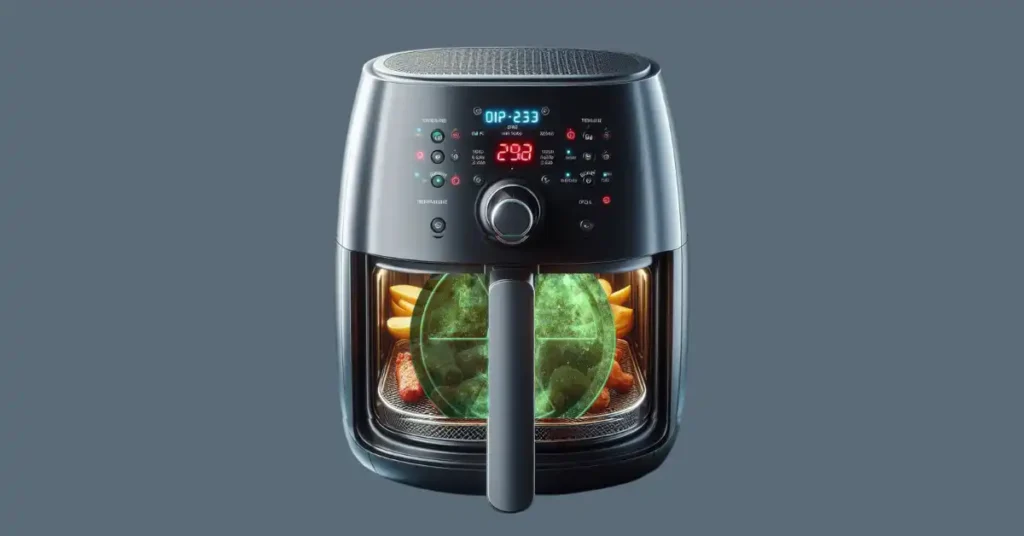
Debunking Common Myths About Air Fryers and Radiation
One of the biggest myths surrounding air fryers is the idea that they emit dangerous levels of radiation, akin to microwaves or even X-rays. However, this couldn’t be further from the truth. Air fryers utilize rapid air technology to cook food; this method involves circulating hot air around the food item, cooking it evenly and giving it that desirable crispy texture without the need for excess oil. Unlike microwave ovens that use electromagnetic radiation to heat food, air fryers rely solely on air, making them significantly different in terms of the technology used and the safety implications. Understanding this key distinction is crucial in appreciating the safety and benefits of incorporating air fryers into your healthy cooking routines.
Understanding Radiation and Its Impact on Cooking Appliances
What is Radiation?
Radiation is an energy form that travels through space and can come from both natural and man-made sources. It’s a common process used in various applications, from medical treatments to cooking our daily meals. Understanding radiation helps demystify concerns about kitchen appliances, especially when questioning, “do air fryers have radiation?” It’s essential to grasp that not all radiation is harmful and that its use in cooking appliances can be perfectly safe.
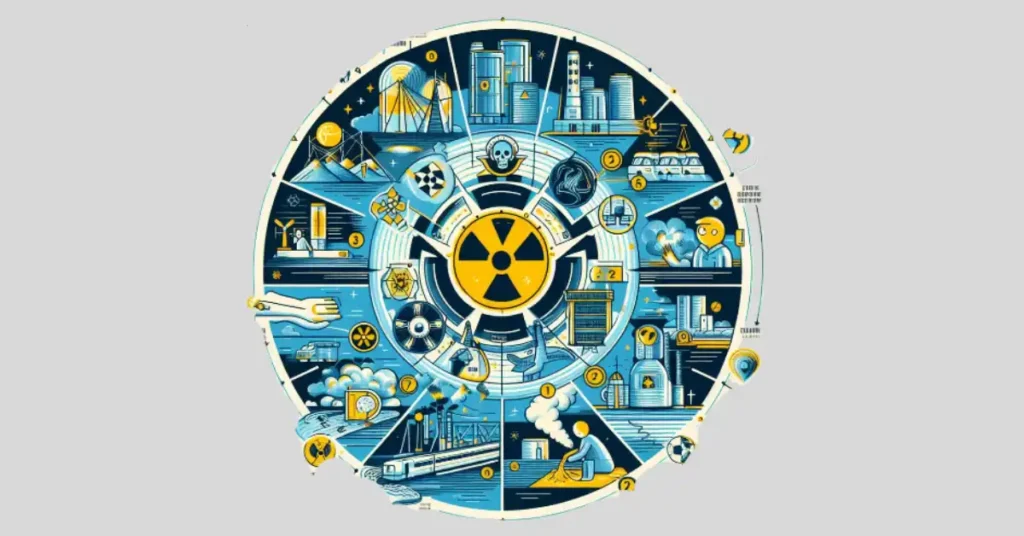
Different Types of Radiation
There are primarily two types of radiation: ionizing and non-ionizing. Ionizing radiation, which includes X-rays and gamma rays, can alter atoms and pose health risks. On the other hand, non-ionizing radiation, like that from radio waves, microwaves, and the technology used in air fryers, is not powerful enough to change atomic structures and is generally considered safe for everyday use. Understanding these distinctions is key to recognizing the safety of various appliances around us.
Radiation in Kitchen Appliances
When it comes to radiation in kitchen appliances, concerns usually arise. Many consumers wonder about the safety of devices like microwaves and, more recently, air fryers. The question “do air fryers have radiation?” highlights a growing interest in how these appliances work and their impact on health. It’s critical to note that air fryers use hot air circulation technology, different from the electromagnetic radiation in microwaves, making them a safe and healthy option for cooking. This method ensures that food is cooked evenly and crisply without the risks associated with ionizing radiation, proving that air fryers are a safe addition to any kitchen.
Convection Heat vs. Radiation: A Comprehensive Guide
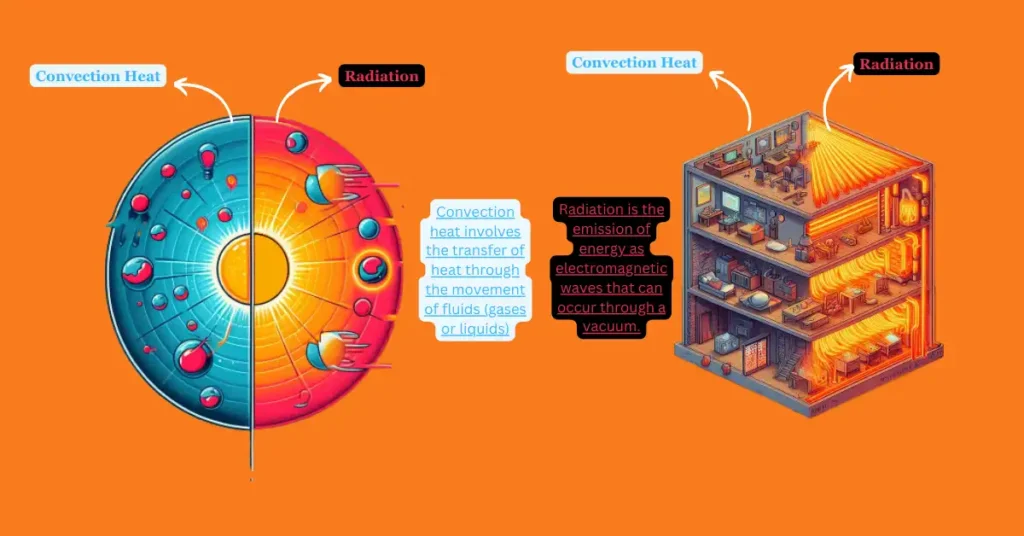
Understanding Convection Heat and Radiation
When it comes to cooking, the terms “convection heat” and “radiation” refer to two distinct methods of transferring heat to food. Convection heat involves the movement of hot air around the food, which is the method used by air fryers. This process ensures even cooking and browning, making it perfect for achieving that desirable crispy texture without the use of excessive oil. On the other hand, radiation refers to the energy released in microwaves, which causes water molecules in food to vibrate and heat up. Both methods are effective, but they work best for different types of cooking needs.
Comparison with Microwave Ovens
While microwave ovens utilize radiation to quickly heat food, air fryers rely on convection heat for cooking. This fundamental difference in cooking technology leads to distinct outcomes. Microwave ovens are excellent for reheating food and cooking certain items quickly, but they often lack the ability to brown or crisp foods effectively, unlike air fryers. Air fryers not only offer a healthier alternative by cooking with less oil but also provide superior texture and flavor to many dishes. The choice between the two appliances largely depends on the cooking method you prefer and the results you’re looking to achieve in your culinary creations.
Safety Concerns Addressed
Do Air Fryers Emit Harmful Radiation?
Contrary to some popular myths, air fryers do not emit harmful radiation. The confusion often arises from a misunderstanding between the cooking technologies used by air fryers and microwave ovens. Air fryers utilize convection heat, circulating hot air to cook food, which is entirely different from the electromagnetic radiation used by microwaves. This makes air fryers a safe cooking appliance, free from radiation concerns.
Debunking Myths About Air Fryers and Health Risks
There are several myths circulating about the potential health risks of using air fryers, many of which stem from confusion around the appliance’s cooking method. Understanding that air fryers cook by circulating hot air rather than using oil or radiation helps debunk these myths. The reduced need for oil not only makes air frying a healthier choice but also eliminates the risk of consuming acrylamide, a substance that can form in foods during high-temperature cooking processes like frying. Therefore, air frying is a safer and healthier alternative to traditional frying methods.
Official Statements From Health and Safety Organizations
Various health and safety organizations have evaluated the safety and health implications of using air fryers. These organizations confirm that air fryers are a safe cooking method. According to the American Heart Association, using air fryers can reduce the intake of unhealthy oils, leading to a healthier diet. Additionally, there have been no official warnings or advisories issued against air fryers by reputed health organizations, further solidifying their status as a safe and health-conscious cooking option.
Benefits of Using Air Fryers
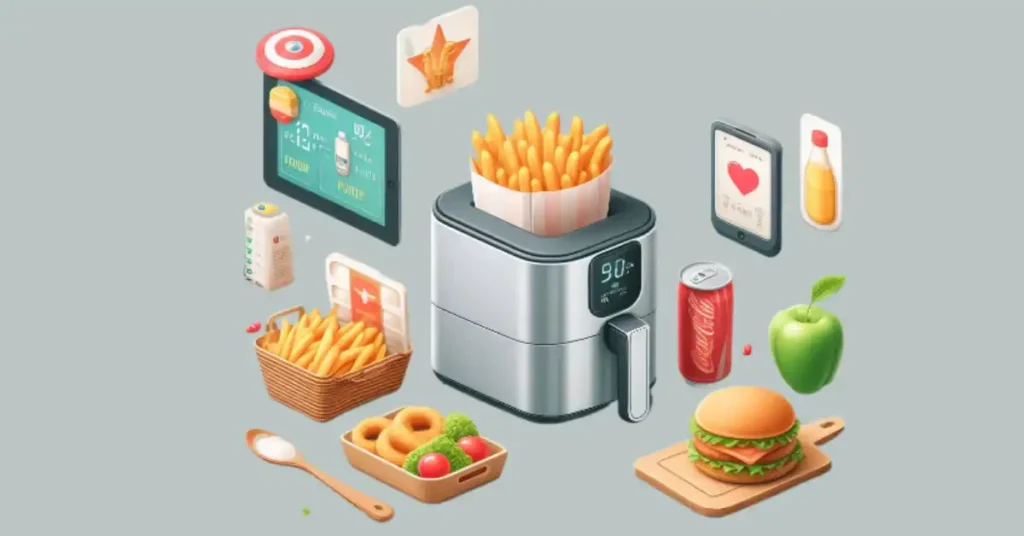
Healthier Cooking Methods
Air fryers offer a healthier way to cook your favorite fried foods. By using hot air to cook, they require much less oil than traditional frying methods. This means you can enjoy crispy fries, chicken wings, and other snacks with less fat and fewer calories. It’s a great choice for anyone looking to cut down on unhealthy fats without giving up the taste and texture of fried foods.
Energy Efficiency and Environmental Impact
Not only are air fryers healthier, but they’re also more energy-efficient than ovens and deep fryers. They cook food faster, which saves time and uses less electricity. This efficiency contributes to a lower environmental impact, making air fryers a more eco-friendly cooking option. Using an air fryer can help reduce your carbon footprint, one meal at a time.
Convenience and Ease of Use
Air fryers are incredibly user-friendly, making them perfect for busy people or those not very experienced in the kitchen. With simple settings and fast cooking times, you can prepare meals quickly and easily. They’re also easy to clean, typically featuring non-stick baskets that are dishwasher safe. This convenience removes the hassle from cooking, providing an effortless way to make delicious meals.
Importance Of Use Of An Air Fryer and How Does It Work?
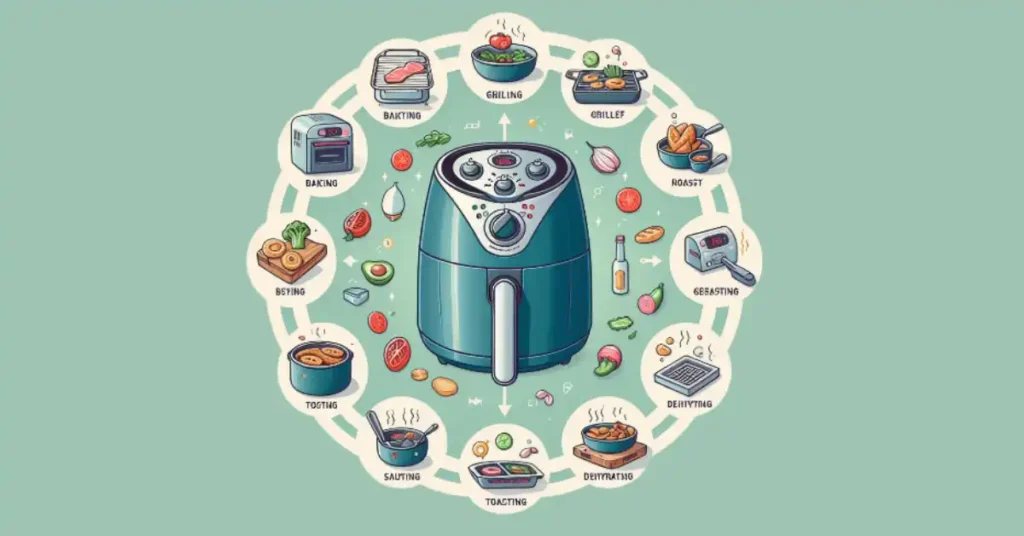
Air fryers are revolutionizing the way we cook, providing a healthier alternative to traditional frying methods. By using hot air circulation technology, air fryers cook food evenly and give it a crispy, delicious texture without the need for large amounts of oil. This not only reduces calorie intake but also minimizes the risk of consuming unhealthy fats. The mechanical process of convection cooking in air fryers involves a fan that circulates hot air around the food, cooking it quickly and efficiently. This technique is what makes air fryers an attractive option for those seeking convenience, speed, and health benefits in their cooking appliances.
Do I Need An Air Fryer If I Have A Convection Oven?
While convection ovens can also circulate hot air to cook food, air fryers offer a more compact, efficient, and faster cooking solution. They are designed specifically to simulate deep frying without submerging food in oil, providing a healthier result. Air fryers heat up much quicker than convection ovens, reducing cooking time and making them ideal for quick meals.
Can Air Fryers Cook Faster?
Yes, air fryers typically cook food faster than conventional ovens due to their smaller size and the technology they use to circulate hot air. This rapid circulation speeds up the cooking process, allowing foods to become crispy and cooked through more quickly.
What Is the Mechanical Process of Convection Cooking?
Convection cooking, the principle behind air fryers, uses a fan to circulate hot air around food, creating a rapid, even cooking environment. This process not only cooks food faster but also ensures that it’s cooked evenly from all sides, mimicking the effect of frying without submerging food in oil.
Can the Use of Air Fryers Cause Cancer?
There’s no evidence to suggest that using air fryers can cause cancer. In fact, air frying may be a healthier cooking method compared to deep frying, as it significantly reduces the formation of potentially harmful compounds that can occur when cooking with oil at high temperatures.
Do Air Fryers Need Oil?
While air fryers operate with significantly less oil than traditional frying methods, a minimal amount of oil is often recommended to help achieve that desired crispy texture. However, this amount is substantially lower, making air-fried foods a healthier choice.
Can Air Fryers Be Used By Kids?
With proper supervision and instruction, air fryers can be a safe tool for older children and teenagers to use. Their simple operation and safety features provide an excellent opportunity for young chefs to start cooking with minimal risk.
Maintenance and Safe Usage
Best Practices for Air Fryer Maintenance
Proper maintenance ensures your air fryer lasts longer and keeps working efficiently. To maintain your air fryer, always allow it to cool down before cleaning. Basic cleaning involves wiping the exterior with a damp cloth and washing the basket, tray, and pan with soapy water. For tougher grime, soaking these parts in warm soapy water can help. Avoid using abrasive cleaners or utensils on the non-stick surfaces. Regularly check and clean the heating element as well to ensure it’s free from food residues.
Tips for Safe Operation
For safe operation, always use your air fryer on a heat-resistant, stable surface and keep it away from walls or other appliances to allow proper air circulation. Do not overload the basket, as this can impair the air flow and cooking efficiency. Use kitchen mitts when handling the basket or tray, as they can get very hot. Additionally, make sure the air fryer is turned off and unplugged when not in use or immediately after use to prevent unnecessary energy consumption and potential hazards.
How to Avoid Common Air Fryer Hazards
To avoid common air fryer hazards, never insert metal utensils or your hands inside the appliance while it’s operating to prevent burns and electric shock. Be cautious of steam and hot air that may emanate from the air fryer, particularly when opening it during or after use. Always ensure the appliance is clean and free from oil buildup, which can pose a fire risk. Never operate the air fryer with a damaged cord or plug, and do not attempt to repair the appliance yourself—seek professional help for any malfunctions.
Conclusion
In summary, this article has addressed several key points surrounding the use and safety of air fryers. We debunked common myths, reassuring that air fryers do not emit harmful radiation, unlike microwave ovens that use electromagnetic waves. Air fryers rely on convection heat to cook food, making them a safe appliance for everyday use. Throughout, we’ve emphasized the health benefits provided by air frying, including reduced oil consumption and lower fat intake, while also highlighting the appliance’s energy efficiency and ease of use.
Air fryers stand out as a convenient and healthy cooking option, debunking the myth of “Do Air Fryers have Radiation?” with solid facts and official statements from respected health organizations. They offer an eco-friendly, energy-efficient alternative to traditional cooking methods, supporting a healthier lifestyle without compromising on the taste and texture of fried foods. Proper maintenance and adherence to safety tips ensure the safe operation of air fryers, contributing to their longevity and performance.
In closing, it’s clear that air fryers are a safe, healthy, and convenient cooking appliance, free from the hazards of radiation and harmful effects associated with traditional frying methods. Their numerous benefits, from health and safety to environmental impact, make them a superior choice in modern kitchens. Whether you’re a novice in the kitchen or a seasoned chef, an air fryer can be a valuable addition to your cooking arsenal, proving that you can enjoy your favorite fried foods without the guilt.
